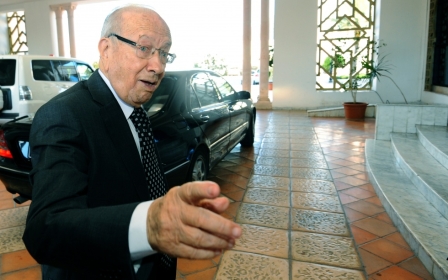Foreign Minister under Ben Ali runs for president in Tunisia

Tunisian President Moncef Marzouki announced Saturday he will stand for re-election in November, in a key vote almost four years after a revolt that sparked the Arab Spring uprisings.
Marzouki, a fierce opponent of ousted dictator Zine El Abidine Ben Ali, formally presented his candidacy at the offices of the electoral authority, watched by journalists.
"I trust the intelligence of the Tunisian people to know who is able to serve," the 69-year-old secular leader told reporters.
Marzouki became Tunisia's first elected president in December 2011, following a vote in the constituent assembly.
It came 11 months after the ouster of Ben Ali that triggered the Arab Spring, which also swept away long-time dictators in Egypt and Libya.
In the wake of the uprising, Tunisia was rocked by violence blamed on hardline Islamists who were suppressed under the former dictator, paralysing the country's institutions.
But after months of wrangling, political parties agreed a deal in June to end the crisis.
More than 50 politicians, including four women, have expressed a desire to run for the presidency.
Ahmed Najib Chebbi has applied to run in the November election. He is a well-known opponent of the ousted Ben Ali and is currently head of the liberal Democratic Progressive Party.
Chebbi told reporters he was “quite confident of winning” after announcing his candidacy.
Others to have put their name forward include Kamel Morjane, Ben Ali’s final foreign minister before the 2011 revolution. A statement from his Al-Moubadara part said he was chosen to stand because of his “experience” and “patriotism”, as well as his “capacity to bring Tunisians together.”
In addition to the presidential elections Tunisia is also expected to hold parliamentary elections on 26 October, according to a law approved recently by the Tunisian Constituent Assembly.
The second round of presidential polls is also expected to be held before the end of this year, following the announcement of first-round results.
There are 190 political parties in Tunisia, most of which emerged following the 2011 uprising that ended the lengthy political career of former president Zine al-Abidine Ben Ali.
Middle East Eye propose une couverture et une analyse indépendantes et incomparables du Moyen-Orient, de l’Afrique du Nord et d’autres régions du monde. Pour en savoir plus sur la reprise de ce contenu et les frais qui s’appliquent, veuillez remplir ce formulaire [en anglais]. Pour en savoir plus sur MEE, cliquez ici [en anglais].




